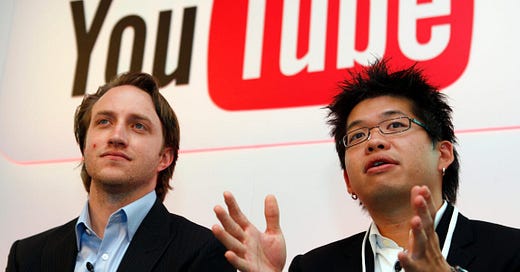Sequoia's Leaked YouTube Investment Memo
How the greatest venture firm considered investing in one of the greatest startups.
A long running topic of my posts has been the challenge of wading through the overgrown content marketing landscape to find quality primary sources that illuminate how business is actually done.
There are few gems as good as Sequoia's original 2005 investment memo on YouTube, which was luckily made public as part of a lawsuit between Viacom and YouTube over copyright infringement with hosted videos.
The filing (I’ve uploaded the full PDF) begins with Sequoia Partner Roelof Botha’s statement that the YouTube team made vigorous efforts to take down copyrighted material, and that viral growth inevitably contains copyrighted material despite reasonable preventative efforts.
It then includes the original memo and pitch deck submitted to the Sequoia Partnership. As always, it’s best to read it yourself.
Though it’s not too relevant in the grand scheme of things, I couldn’t help but notice how cheap deals were back then. Small funds could purchase huge amounts of equity for cheap. Luckily for entrepreneurs, there can be less dilution and more cash these days.
Our proposal is to invest $1m in the seed stage, followed by a $4m Series Aonce specific milestones are met. Sequoia would own ~30% post Series A, with a pool of ~17%.
The growth chart is an excellent example of how things work in reality. There is no continuous growth. There are 3 weeks of no change, and a couple viral moments that spike the user stats.
A thoughtful investor would be reasonable to have suspicion over these metrics. From 8/1/2005 to 8/26/2005 there’s actually not much of a growth pattern. It’s sporadic and relatively flat. But of course this investment is not about the metrics, as much as the team and market.
The untold story of YouTube is that the founding team got jobs at Facebook super early when the team had recently moved to California. I heard this from one of our LPs who was an angel investor in YouTube and early Facebook exec. (Side-note: this is a great example of how much early Facebook was a talent magnet. The best companies are.)
The engineering leader at the time noticed this side-project, pulled the YouTube team aside, and said something along the lines of “hey, if you want to start a company, great, I’ll angel invest. But you need to pick between that and Facebook.”
And thus YouTube was born.
My suspicion is that this was much more of a team bet than anything. Although the memo contains some great content including:
The competitive landscape
Expected cost curves of relevant database and bandwidth technology
Early user traction
The economics of video
Ultimately I assume the Sequoia team saw a great team, a big market, and pulled the trigger. At the seed stage there is not much else to look at.
Again, read the full legal filing, investment memo, and YouTube pitch deck here! Subscribe below for future reads.
Views expressed in any content, including posts, linked on this website or posted to social media and other platforms are my own and not the views of Contrary LLC or any affiliate. None of the content should be construed or relied upon in any manner as investment, legal, tax, or other advice. You should consult your own advisers as to these matters. Under no circumstances should any posts or content be construed as any offer to provide advisory services or a solicitation of any investment in any security or investment vehicle. Certain information has been obtained from third party sources and has not been independently verified. The content speaks only as of the date indicated. Any projections, estimates, forecasts, targets, prospects, and/or opinions expressed in these materials are subject to change without notice and may differ or be contrary to opinions expressed by others. Past performance is not necessarily indicative of future results. See contrary.com/legal for additional important information.






Super interesting, thank you.
This great! Do you think Youtube will change the way they operate given content on the internet is heading towards ppl trying to own all their content themselves and not use intermediaries like Youtube?